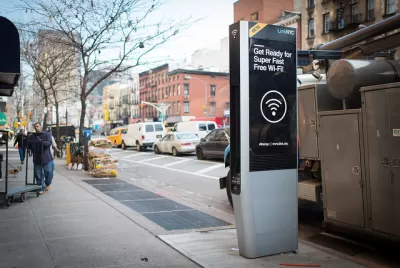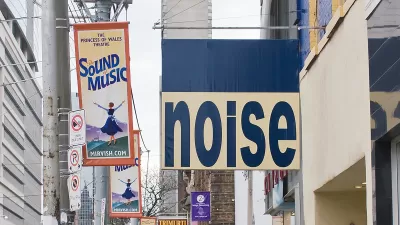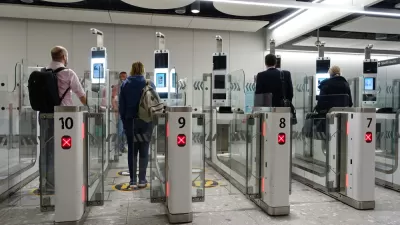The big city isn't such an anonymous place anymore.

Ben Green, author of The Smart Enough City: Putting Technology in Its Place to Reclaim Our Urban Future, writes to explain the many ways "smart city" technology is a torjan horse for new kinds of corporate surveillance.
The first example Green cites on this theme are the 1,700 LinkNYC kiosks installed around the city, providing provide public Wi-Fi, free domestic phone calls, and USB charging ports.
Yet the LinkNYC kiosks are not just a useful public service. They are owned and operated by CityBridge (a consortium of companies that includes investment and leadership from Sidewalk Labs — a subsidiary of Alphabet, the parent company of Google) and are outfitted with sensors and cameras that track the movements of everyone in their vicinity. Once you connect, the network will record your location every time you come within 150 feet of a kiosk.
So, according to Green, smart city technology is just as much, if not more, about expanding the collection of personal data by government and corporations than improving the experience of the city or delivering services that make the daily lives of citizens easier or more prosperous.
If the implications of these smart city technologies are understood correctly the social contract of the future includes smart city technologies functioning as "covert tools for increasing surveillance, corporate profits and, at worst, social control."
Green has prescriptions for these dystopian outcomes that don't involve an anti-technology movement or a return to the Bronze Age. Green cites the Array of Things project in Chicago as an example of the democratic deliberation that can serve as an antidote to corporate surveillance.
FULL STORY: Smile, Your City Is Watching You

Alabama: Trump Terminates Settlements for Black Communities Harmed By Raw Sewage
Trump deemed the landmark civil rights agreement “illegal DEI and environmental justice policy.”

Study: Maui’s Plan to Convert Vacation Rentals to Long-Term Housing Could Cause Nearly $1 Billion Economic Loss
The plan would reduce visitor accommodation by 25% resulting in 1,900 jobs lost.

Planetizen Federal Action Tracker
A weekly monitor of how Trump’s orders and actions are impacting planners and planning in America.

Wind Energy on the Rise Despite Federal Policy Reversal
The Trump administration is revoking federal support for renewable energy, but demand for new projects continues unabated.

Passengers Flock to Caltrain After Electrification
The new electric trains are running faster and more reliably, leading to strong ridership growth on the Bay Area rail system.

Texas Churches Rally Behind ‘Yes in God’s Back Yard’ Legislation
Religious leaders want the state to reduce zoning regulations to streamline leasing church-owned land to housing developers.
Urban Design for Planners 1: Software Tools
This six-course series explores essential urban design concepts using open source software and equips planners with the tools they need to participate fully in the urban design process.
Planning for Universal Design
Learn the tools for implementing Universal Design in planning regulations.
Caltrans
Smith Gee Studio
Institute for Housing and Urban Development Studies (IHS)
City of Grandview
Harvard GSD Executive Education
Toledo-Lucas County Plan Commissions
Salt Lake City
NYU Wagner Graduate School of Public Service





























